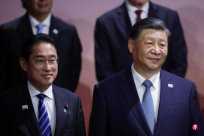Source: Bloomberg
The amount of foreign investors' increase in holdings of Chinese bonds suddenly rose, so the outside world thought that the pessimism of Chinese assets may be a bit too much.But now celebration may be too early.
According to China's foreign exchange regulatory agencies, the net increase in net holdings in the world's second largest bond market last month reached 251 billion yuan (33 billion US dollars), which was high in history.The scale of net holdings was almost six times in October, and last year, 616 billion yuan flowed out of RMB bonds, setting a record.
The accident of inflowing of funds is more due to the rise in global bonds. Traders bet that the Fed will turn to the currency easing policy as soon as possible. The passive management index tracking funds also have demand.Considering the restrictions on Beijing and the willingness to relax the policy, the abstinence of the outside world of China's long -term debt, and the cheaper emerging market assets are more attractive, and the momentum of capital inflows may slow down.
Kiyong Seong, the chief Asian macro strategist of the French Industrial Bank in Hong Kong, said that with the looseness of the currency in other places in the next six months, it will be greater than China, and Chinese bonds are unlikely to win other global bonds.He believes this is unsustainable.
Seong added that foreign capital inflows in all parts of Asia in November, showing that China has also benefited from the overall trend.
Be careful of the central bank's attitude
The People's Bank of China has twice reduced the key policy interest rates this year, but it has been remained unmoved since August, relying on the currency market to drive economic growth.The high -level leadership in the first year of this month also made the hopes for the introduction of large -scale stimulus measures.
In view of the expansion of the China -U.S. spreads to the RMB, the Fed's policy tightening cycle has hindered the central bank of the People's Republic of China to adopt radical loose measures.Fed officials have tried to alleviate the expectations of the outside world in recent days, which means that the difference between the two countries is unlikely that the difference between the two countries will soon shrink.
Although theoretically, the Fed's hawk position will weaken next year, and it may open the door for further relaxation of the People's Bank of China. However, the policy interest rate of the People's Bank of China is already at a historical low.As credit growth and investment are still weak, the effectiveness of the central bank's currency looseness has caused doubts, and Beijing may also lack the motivation to significantly reduce the cost of lending.



